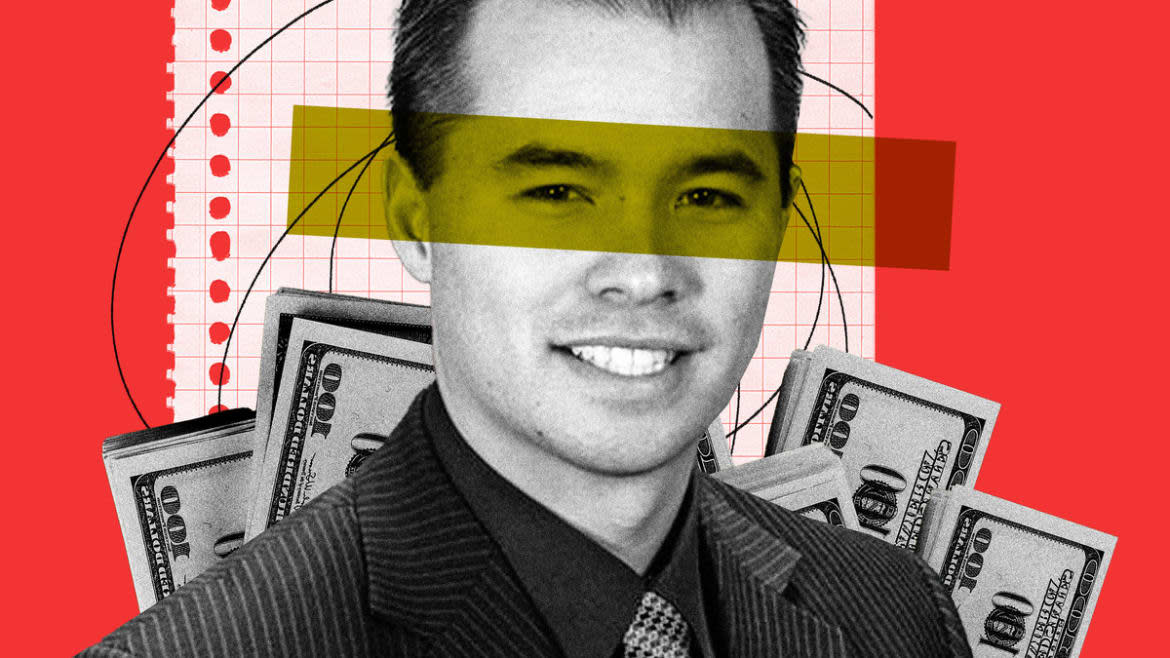Victims Say $39M Ponzi Scheme Was a Father-Son Operation

A California man is accused of running a $39 million Ponzi scheme, and spending at least $7 million of investors' stolen money to fund his own “lavish lifestyle.”
Derek Chu, 41, of Alamo, Calif, was charged with eight counts of money laundering and three counts of wire fraud in federal court last week.
Between 2013 and 2020, the indictment alleges, Chu used several companies to raise $29 million from hundreds of investors, promising the funds would be used to buy and resell professional basketball tickets and luxury suites at Oracle Arena, in Oakland, California; the Staples Center, in Los Angeles, California; and the Chase Center, in San Francisco, California.
Instead, prosecutors say, Chu diverted millions of dollars, which he spent on luxury cars, expensive jewelry, and travel.

Derek Chu raised $29 million promising the funds would be used to buy and resell luxury suites at Oracle Arena, California.
In 2018, Chu promised one alleged fraud victim that he could offer them $5,000 of interest on their investment of $250,000 for Golden State Warriors basketball tickets, the complaint shows. Instead, he passed the funds on to a family member, a close family friend, paid off credit card debt and utility bills, and reimbursed other investors, according to the complaint.
The following year, Chu took an investor to visit the Chase Center in San Francisco, telling them they would earn a 50 percent interest if they invested in a suite for $440,000, the complaint alleges. Chu then used the money to buy over 20 cashier’s checks made out to many different individuals and to withdraw $10,000 in cash, prosecutors say.
In classic Ponzi scheme style, the complaint alleges, Chu used money from later investors to pay back earlier investors, concealing the fact that he was not making any of the investments he had promised.
This is only Chu’s latest brush with the law.
Chu was caught up in a case that also accused his father, Felix Chu, of running a Ponzi scheme.
Felix Chu was accused of running an elaborate fraud that scammed elderly people and other unwitting investors out of their life savings, according to a civil suit filed in 2021. Felix Chu was accused of scamming elderly investors by persuading them to purchase unregistered promissory notes using their retirement funds, life insurance proceeds, and other assets. Each of these notes was issued by Felix Chu, Derek Chu, or entities they controlled, according to Insurance News Net. Ultimately, the complaint claimed, the Chus stopped paying interest on the notes, causing at least one investor to lose her life savings.
Felix Chu, the investors claim, lived an “ostentatious” life using their money, and bought a luxury car. They also claim that Felix diverted their funds into Derek’s ticket resale business, according to court documents.
The case is still making its way through the courts.
In yet another case from 2019, Chu, along with his father, Felix Chu, was sued in San Francisco civil court by Jonathan and Carol Mayeda, a couple who alleged Derek scammed them out of hundreds of thousands of dollars over a period of three years, and his father abetted the crime.
At the time, Felix and Derek Chu were both working with New York Life Insurance, one of the country’s largest insurance firms.
The Chus had been friends with Carol Mayeda’s family for decades, the complaint alleges, and Felix Chu had sold insurance policies to Carol’s grandmother and mother.
In 2012, Felix and Derek asked Satoshi Mayeda, Jonathan’s father, to lend Derek money to open his own business, and promised to pay back profits in the form of interest on the loan. Satoshi agreed, and signed a promissory note, according to the court documents. Satoshi went on to loan Derek more money, even after his business collapsed in 2013, the complaint alleges. Jonathan Mayeda, too, loaned Derek money.
At the time he was taking money from Satoshi and Jonathan Mayeda, Chu purchased tickets for a luxury suite at the Oracle Arena in Oakland, then the home of the Golden State Warriors. Derek Chu told the Mayedas he was using the suite to network with clients and was making “significant profits” from reselling tickets to basketball games and tickets to concerts, the court documents allege. In 2016, Derek spent $2 million on season tickets to a luxury suite at the Chase Center in San Francisco, which was then under construction.
Chu also began to indulge in his love of collecting luxury cars, the court documents allege, eventually buying more than 12 expensive Lexus automobiles. Later, he moved on to Porsches, buying some models worth $200,000, according to the complaint. Chu told the Mayedas that he was purchasing luxury watches and collectible sneakers and routinely traveling on private jets, the pair allege.

The multimillion dollar home Derek Chu purchased in Alamo, California, during the period he is accused of running a Ponzi scheme.
In 2017, Chu bought a house in Alamo, Calif, in the same upscale neighborhood as NBA legend Stephen Curry. He told the Mayedas his newfound wealth was “a result of his successful business ventures,” they allege in the complaint, and persuaded them to loan him more money. Each time, they signed a promissory note, according to the court documents.
In total, Jonathan Mayeda loaned Derek Chu upwards of $750,000 over the course of three years, according to court records. Although Chu did make interest payments on the loans, the Mayedas eventually began to get suspicious when in September 2018, Chu attempted to sell them some collectible sneakers and a luxury handbag, they allege.
When Jonathan Mayeda pressed Chu to repay the loans, Chu told him he did not, in fact, own his expensive house in Alamo, nor did he have much equity in his luxury vehicles, according to the documents.
“Jonathan and Carol began to believe that their money might have been used to fund Derek’s luxurious lifestyle throughout the years instead of being successfully invested,” the court documents allege.
The Mayedas sued Chu for breach of contract, fraud, and unjust enrichment. In July 2022, Chu was ordered to pay the Mayedas over a million dollars in damages and attorney fees, court records show.
Now, Chu faces up to 20 years in prison for each wire fraud count and 10 years in prison money-laundering count, as well as up to $500,000 in fines.
Chu’s public defender did not respond to a request for comment.
Get the Daily Beast's biggest scoops and scandals delivered right to your inbox. Sign up now.
Stay informed and gain unlimited access to the Daily Beast's unmatched reporting. Subscribe now.

